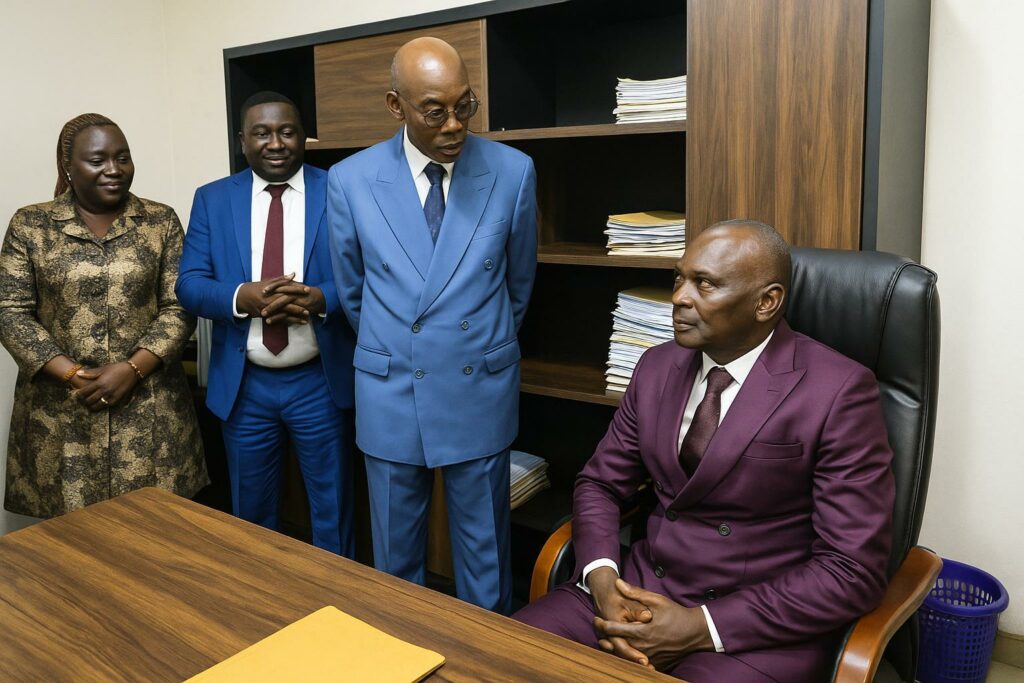A strategic appointment for national literacy
The modest but solemn ceremony held in Brazzaville on 7 November 2025 placed the question of literacy at the very centre of the government’s educational agenda. By installing Remy Alain Blaise Boumba as Director-General for Literacy and Non-Formal Education (DGAENF), the Minister of Pre-School, Primary, Secondary Education and Literacy, Jean-Luc Mouthou, reaffirmed the executive’s resolve to accelerate the reduction of illiteracy across the Republic of Congo. The presidential decree of 3 November had already signalled the Head of State’s confidence in the 61-year-old pedagogue; the investiture brought that decree to life, underlining the strategic nature of the post, which supervises community learning centres, adult programmes and alternative pathways for out-of-school youth.
A seasoned educator with union roots
Born on 3 June 1964 in Boko-Songho (Bouenza), Mr Boumba carries into office a professional trajectory that spans classroom teaching, inspection missions and policy management. A certified French-language secondary-school teacher, he successively served as Director of Orientation and Student Services, Itinerant Inspector, and Director of Adult Literacy. Away from his administrative desks he helped establish the Syndicat national des enseignants pour l’égalité et le renouveau and the Collège syndical de l’enseignement, earning recognition among peers for his conciliatory style and institutional loyalty. Such dedication was formally acknowledged in August 2010, when he was elevated to the rank of Chevalier in the Congolese Order of Devotion. Observers of the education sector therefore regard his promotion as both a reward for steadfast service and a calculated bet on experience.
Four pillars to revitalise non-formal education
In his first statement as Director-General, Mr Boumba set out an agenda that he described as “both pragmatic and transformative”. The blueprint rests on four interconnected pillars. First, the strategic framework for literacy will be overhauled to ensure that national directives echo current socio-economic realities. Second, delivery mechanisms for non-formal education will be professionalised, with emphasis on teacher training and standardised curricula. Third, governance and institutional performance will be tightened through clearer accountability channels, digital monitoring and data-driven evaluation. Finally, partnerships with bilateral donors, civil-society organisations and the private sector will be deepened to leverage technical expertise and sustainable financing. By requesting swift implementation of the resolutions adopted at the September 2024 National Council on General Education, he made clear that results, not rhetoric, would be the true measure of success.
Ministerial guidance and institutional rigour
While conferring the insignia of office, Minister Mouthou congratulated the new incumbent and expressed high expectations regarding “a diversified, accessible and quality offer in non-formal education”. He urged “steadfast diligence and strict observance of the regulatory corpus”—words that resonate in a directorate often challenged by disparate regional realities, limited budgets and the logistical hurdles of servicing remote communities. The ministry’s leadership believes that reinforcing the DGAENF will create positive spill-overs for the entire schooling ecosystem, from early childhood to secondary level, by offering a second chance to adults and adolescents who slipped through the cracks of formal schooling.
Anticipated impact on communities and partners
Stakeholders present at the ceremony, ranging from senior officials to grassroots facilitators, welcomed the roadmap with measured optimism. Community educators voiced hope that the envisaged professionalisation will translate into improved status and remuneration for field instructors. Development partners, for their part, emphasised that robust governance frameworks would enhance the credibility of literacy projects and unlock additional funding envelopes. For local authorities, strengthened adult-learning schemes promise noticeable social dividends: better livelihood prospects, higher civic participation and a gradual narrowing of urban–rural disparities. Mr Boumba’s challenge lies in turning the early consensus into a sustained implementation momentum capable of withstanding administrative cycles and fiscal fluctuations.
Looking ahead: from mandate to measurable progress
The Director-General’s tenure thus opens under the dual banner of continuity and innovation. His deep familiarity with ministerial procedures should facilitate swift alignment with existing plans, while his unionist background may foster constructive dialogue with staff and beneficiaries alike. The coming months will test the resilience of the proposed four-pillar scheme as budgetary allocations are finalised and monitoring tools go live. Yet the political signals emitted since 3 November suggest a supportive environment for reform. Should Mr Boumba succeed in embedding evidence-based management and broadening partnerships, the Republic of Congo could edge closer to its own target of universal functional literacy, reinforcing the country’s human-capital foundation and, by extension, its long-term development outlook.

